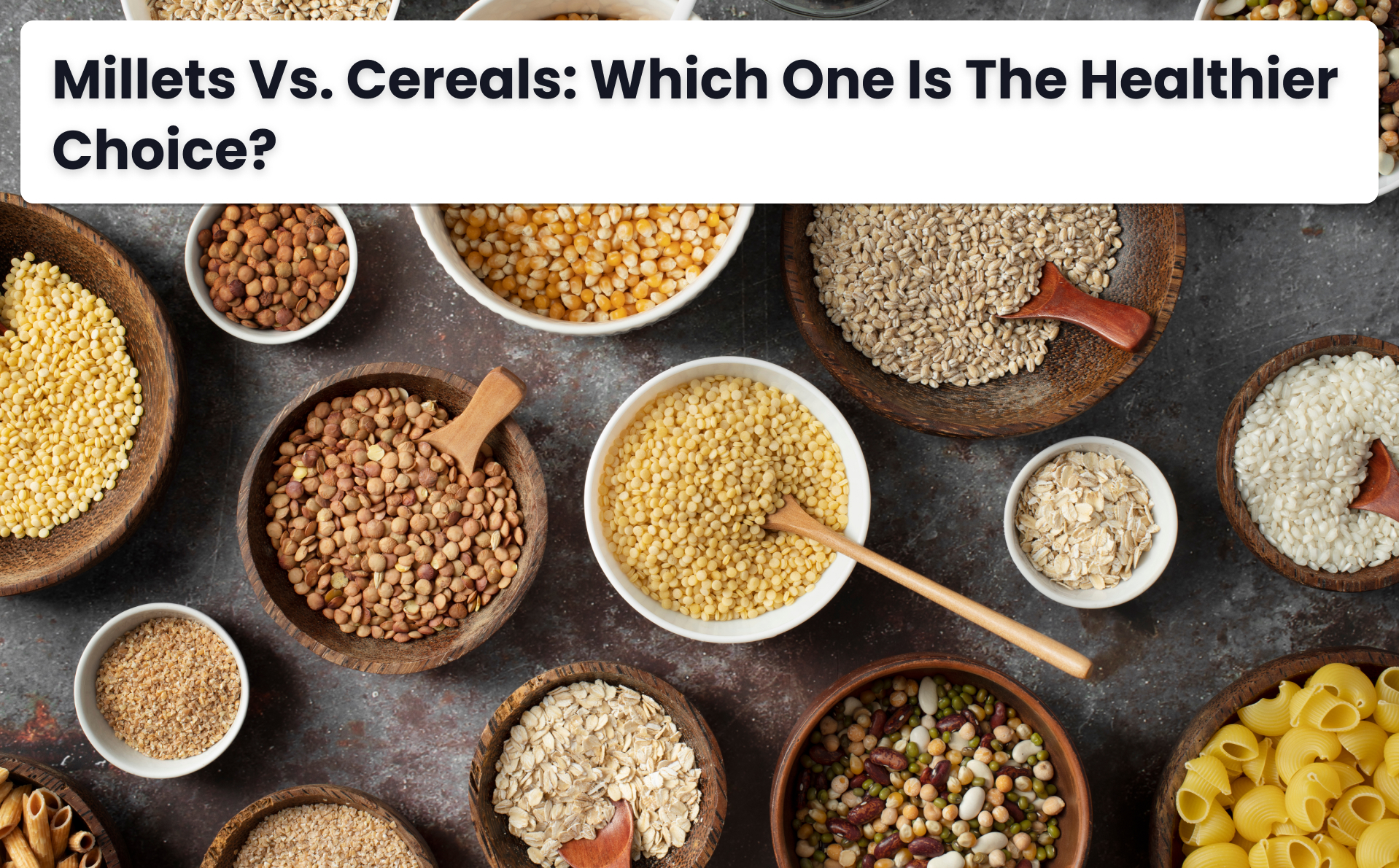
Millets vs. Cereals: Which Grain Should You Choose?
When it comes to healthy eating, making the right choice of grains can significantly impact your diet. Millets and cereals are two popular types of grains that are consumed worldwide. But, with growing health consciousness, many people are questioning which is the better choice for their health: millet vs. cereals. In this blog, we’ll explore the nutritional profiles, health benefits, and culinary uses, and guide making the right choice for your dietary needs.

What Are Millets and Cereals?
Millets Millets are small-seeded grains belonging to the Poaceae family, cultivated for thousands of years. They are known for their resilience to harsh climates and are grown worldwide. Some popular types of millets include pearl millet, finger millet, foxtail millet, and proso millet.
Cereals, on the other hand, are grains like wheat, rice, corn, oats, and barley, which are also staple foods worldwide. These grains are commonly used to make a wide variety of food products, from bread to pasta and breakfast cereals.
Cereals, on the other hand, typically refer to grains such as wheat, rice, corn, oats, and barley, which are widely consumed worldwide. These grains form the basis of many staple foods, including bread, pasta, and breakfast cereals.
Nutritional Comparison
| Nutrient | Millets (per 100g) | Cereals (e.g., Rice/Wheat) (per 100g) |
|---|---|---|
| Calories | 100-150 | 130-370 |
| Protein | 11-12g | 2-14g |
| Carbohydrates | 20-30g | 28-77g |
| Fiber | 8-9g | 0.5-3g |
| Iron | 3-5mg | 0.4-1.5mg |
| Magnesium | 70-100mg | 20-70mg |

Health Benefits of Millets
- Rich in Nutrients: Millets are packed with essential nutrients, including proteins, fiber, vitamins, and minerals. They provide a higher nutrient density compared to many common cereals.
- High Fiber Content: Millets are an excellent source of dietary fiber, which promotes digestive health and helps maintain a healthy weight by keeping you full for longer.
- Low Glycemic Index: Millets have a low glycemic index (GI), which means they release glucose slowly into the bloodstream, making them a good choice for people with diabetes.
- Gluten-Free: Millets are naturally gluten-free, making them a suitable alternative for individuals with celiac disease or gluten sensitivity.
- Heart Health: The presence of antioxidants and healthy fats in millets can help lower cholesterol levels, reducing the risk of heart disease.

Health Benefits of Cereals
- Energy Source: Cereals are a significant source of carbohydrates, providing the energy needed for daily activities.
- Fortified Options: Many cereals are fortified with essential vitamins and minerals, such as iron, folic acid, and B vitamins, enhancing their nutritional value.
- Variety and Versatility: Cereals come in various forms and flavors, making them easy to incorporate into meals, snacks, and baked goods.
- Sustained Energy Release: Whole grain cereals, in particular, can provide sustained energy release due to their fiber content, helping to stabilize blood sugar levels.
- Widely Available: Cereals are more widely available and come in numerous varieties, making them accessible and convenient for many people.
Culinary Uses
Millets:
- Can be cooked as a whole grain or ground into flour for various dishes like porridge, pancakes, or bread.
- Popular in dishes such as millet pilaf, idlis, and khichdi.
- Can be used as a base for salads or served as a side dish.
Cereals:
- Can be consumed as breakfast cereals, in the form of porridge, or as ingredients in baked goods like bread and muffins.
- Versatile enough to be used in salads, soups, and casseroles.

Which Is the Better Choice?
The choice between millets and cereals ultimately depends on individual dietary needs and preferences. Here are some factors to consider:
- Nutritional Goals: If you’re looking for higher protein and fiber content, millets may be the better choice. However, if you need a quick source of energy, cereals might be more suitable.
- Gluten Sensitivity: For those with gluten intolerance, millets are an excellent gluten-free option, whereas many cereals contain gluten (like wheat and barley).
- Dietary Variety: Incorporating both millets and cereals into your diet can provide a diverse range of nutrients and flavors.
Summary
Millets vs. Cereals: Making the Right Choice for Your Diet
Millets and cereals are two grain options that offer distinct health benefits and culinary uses. Millets are rich in nutrients, high in fiber, gluten-free, and have a low glycemic index, making them a great choice for those seeking healthy alternatives. Cereals provide quick energy, are often fortified with essential vitamins and minerals, and offer a wide variety of options. Ultimately, both can fit into a balanced diet, and incorporating both can enhance your nutritional intake and meal variety.





